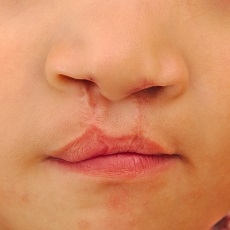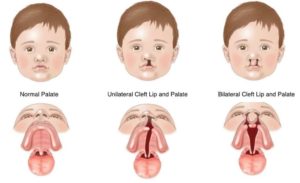According to the Centers for Disease Control, July is National Cleft and Craniofacial Awareness and Prevention Month. You may not be familiar with these relatively common birth defects, but cleft lips and palates can have severe impacts on a child’s well-being.
Types of Clefts
Clefts and craniofacial defects occur early in pregnancy. As the lobes of an embryo fuse together, an individual with a cleft will have incomplete fusion, leaving a split or hole in their hard palate or lip. In mild cases, this may manifest as a simple valley in the upper lip which is relatively easy to correct. In severe cases, there may be communication between the oral cavity and the sinus, or even high into the skull and face. Most clefts happen to the upper part of the mouth, but they can also happen to the jaw.
Causes and Prevention
There is likely a genetic component to craniofacial defects like cleft lip and palate. However, while the causes of most cleft lip and palate cases are unknown, smoking during early pregnancy has been strongly correlated to an increased risk for cleft palate in addition to other risks such as low birth weight. The Surgeon General strongly urges women who are pregnant or considering becoming pregnant to stop smoking immediately. Women diagnosed with diabetes before becoming pregnant may also have a higher risk factor, as well as those who take certain medications to treat epilepsy.
The key to preventing cleft lip and palate defects is to speak with your doctor as soon as possible if you think you may be pregnant, or plan to become pregnant, and to try and eliminate or reduce your risk factors as early as possible.
Prognosis
An estimated 7,000 babies are born with clefts in the U.S. every year. In most cases, surgery is performed to correct these defects between 3 and 6 months of age. However, clefts can create a variety of difficulties such as eating, nursing, and speaking, and make children more susceptible to ear and sinus infections as well as creating dental issues. Most children with a cleft have misaligned teeth and will need fairly extensive orthodontic and dental work in the future.
Help spread awareness of this issue through the month of July! Babies who undergo surgery to correct a cleft lip or palate are frequently left with lifelong scars, but we can help make their journey easier with kindness and understanding. Keep smiling, Orlando!




